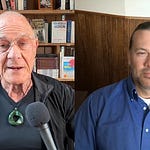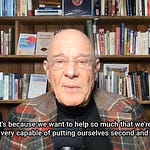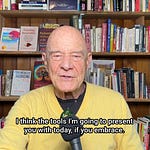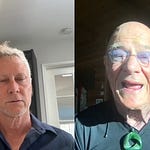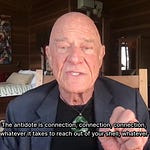Dear friends,
Recently, I had the profound opportunity to interview Dr. Monnica Williams, a distinguished clinical psychologist whose work on racial trauma has transformed our understanding of how racism affects mental health. As someone with 64 years of clinical practice, I was deeply moved by our conversation.
What struck me most was Dr. Williams' ability to illuminate how racism operates invisibly—in our institutions, our interactions, and even within ourselves. Many of us have been conditioned not to see racism, even when it's happening right before our eyes. This "social collusion," as Dr. Williams calls it, creates a reality where people of color are constantly gaslit, made to question their own experiences.
I found myself reflecting on my own journey witnessing racism—from seeing my college roommate Abe Woodson physically thrown out of a barbershop in 1955 to learning how my colleague, a university vice chancellor named Dr. Russ Ellis, wouldn't knock on doors in my white neighborhoods for fear of "the look" he might receive. These experiences barely scratch the surface of what people of color navigate daily.
Golden light,
Dr. Richard L. Miller
Links & Resources
Healing the Wounds of Racial Trauma by Dr. Monnica Williams
The Kenneth Clark Doll Study - The landmark research mentioned in our conversation
American Psychological Association's Apology for Role in Promoting Racism
Mind Body Health Politics Archives - Access our full interview and 20 years of open-source archives
Work with Me
After six decades as a practicing psychotherapist, I'm offering limited opportunities to work directly with me. I bring extensive experience addressing anxiety, depression, trauma, relationship challenges, addiction, and psychedelic integration.
One-to-one sessions - Individual therapy tailored to your specific needs and goals. To request an appointment, email DrRichardLMiller@gmail.com with subject line "Contact Request." Include what you hope to accomplish and your phone number.
Group Therapy - Join a small, curated group committed to personal growth. Experience community support while learning from others and developing tools for lasting transformation.
Mind Body Health Seminars - My comprehensive 10-week program combines experiential practice with foundational teaching on mind control techniques. This structured approach provides a complete toolkit for mastering your mind.
What Is Racial Trauma?
Racial trauma is a psychological injury caused by hate or fear of a person due to their race, ethnicity, or skin color. But it isn't just caused by individual acts of hatred or fear—it's also systematically produced by the structures of racism all around us.
The cumulative nature of racial trauma creates a burden that eventually overwhelms a person's ability to cope. Think about this sobering reality: virtually every person of color in America is suffering from some form of racial trauma.
Dr. Williams describes it as "ongoing traumatic stress disorder" rather than post-traumatic stress disorder, because for many people of color, the trauma isn't in the past—it's happening with distressing regularity:
When driving and being pulled over for "driving while Black"
When shopping and being followed by security
When seeking medical care and not being believed about symptoms
When applying for jobs and having resumes overlooked due to "ethnic" names
Each of these experiences compounds the psychological injury, creating a burden that takes a tremendous toll on mental and physical health.
The Invisible Power of Microaggressions
"Where are you really from?" "You speak English so well!" "Can I touch your hair?"
These seemingly innocent questions and comments represent what Dr. Williams calls "microaggressions"—subtle, often unconscious acts of racism that communicate denigration, exclusion, or othering based on race.
What makes these interactions particularly harmful is that they're deniable. The person committing the microaggression can easily say, "I was just curious" or "I meant it as a compliment," while the impact remains harmful. These small, daily indignities maintain racial hierarchies in subtle ways, keeping people of color from feeling or being treated as equals.
According to Dr. Williams, some scholars have attempted to dismiss microaggressions as insignificant or lacking evidence. Yet her research confirms what people of color have long known—these everyday slights cause real harm over time.
Systemic Racism: Beyond Individual Bias
One of the most troubling insights from our conversation was the extent to which racism has been embedded in systems that should be sources of help and healing.
When Dr. Williams shared that it took nearly 80 phone calls for a Black man to find a therapist willing to see him in one study, I was shocked. This example illustrates how systemic racism operates even without explicitly biased individuals—structures themselves can perpetuate inequality through seemingly neutral policies and practices.
In a particularly moving example, Dr. Williams shared a story about a lab member who was consistently late to meetings because he kept being pulled over by police on his commute. This perfectly illustrates how systems of policing that disproportionately target Black men create ripple effects throughout their lives.
Even more disturbing was her account of a Black woman who, just days before our interview, had been handcuffed and detained while shopping when a store employee falsely accused her of shoplifting. For 40 minutes, she sat in a police car not knowing what would happen to her. Two years later, she still struggles with anxiety.
The Painful Reality of Internalized Racism
Perhaps one of the most insidious aspects of racism is how it becomes internalized. Dr. Williams explained how people of color, living in a racist society, can absorb negative ideas about themselves and their group:
"Many people of color have ingested these ideas and have what we call internalized racism, where they don't like their own group, they don't like themselves."
This phenomenon helps explain why some people of color might vote against their own interests or perpetuate harmful stereotypes about their own communities. It's also a factor in colorism—discrimination based on skin tone within communities of color—which has roots in slavery and continues to impact everything from criminal sentencing to social status.
Three Things You Can Do Right Now
When I asked Dr. Williams for three concrete actions people can take to combat racism, she offered these practical steps:
Diversify your social networks: Make a deliberate effort to expand your circle to include people of different racial and ethnic backgrounds. Patronize businesses owned by people of color, join diverse organizations, and seek out opportunities for authentic connection.
Support anti-racist organizations: Find organizations working to combat racism and support them financially. "Anybody can do that," Dr. Williams noted. "That's super easy—you just go online and push a button."
Practice everyday kindness: The next time you encounter a person of different race, make a point to be friendly. Smile, make eye contact, hold the door, or say something nice. As Dr. Williams puts it, "Just little nice things for people could go a long way."
Recognizing Your Own Biases
A critical part of addressing racism is examining our own biases. I shared with Dr. Williams how I once noticed my own microaggression when I was surprised by how perfectly English-speaking some Asian American picketers spoke—forgetting they were likely born in the United States just as I was.
Dr. Williams suggests asking yourself:
Who's in your social circle? Are they diverse or mostly like you?
Who do you serve professionally? Does your client base reflect the diversity of your community?
When you've witnessed racism, have you spoken up or remained silent?
Do you lock your car doors in certain neighborhoods but not others?
These questions can help uncover unconscious biases we may not realize we hold.
Moving Forward Together
The work of addressing racism—both within ourselves and in our society—is ongoing. As Dr. Williams' research and treatment programs demonstrate, healing is possible, but it requires acknowledgment, commitment, and action.
Psychology as a discipline has begun to reckon with its own racist foundations. The American Psychological Association has apologized for psychology's role in promoting racism, including the development of IQ tests originally designed to "prove" white intellectual superiority.
This acknowledgment is an essential step, but much more work remains. Dr. Williams continues to develop and test treatment protocols for racial trauma, while advocating for systemic changes in psychology and beyond.
As I reflect on our conversation, I'm reminded that addressing racism isn't just about avoiding harm—it's about actively creating a more just and equitable world. As Dr. Williams puts it, "Nobody stands up to do anything," and this silence maintains the status quo.
By breaking that silence, examining our biases, diversifying our social circles, and standing up against injustice when we see it, we can all contribute to healing the wounds of racial trauma.
To hear the full interview with Dr. Monnica Williams, visit mindbodyhealthpolitics.org, where you can access this and hundreds of other interviews from our archives—completely free and open-source.
Now Available: Psychedelic Medicine at the End of Life
You can now order my latest book, Psychedelic Medicine at the End of Life: Dying Without Fear. This work represents a culmination of my decades-long journey as a clinical psychologist, exploring how psychedelics can transform our approach to death and dying.
The book examines how substances like LSD, MDMA, and psilocybin can be powerful tools in confronting our fears of mortality, ultimately leading to richer, more fulfilling lives. I'm honored to include insights from renowned experts in the field, as well as my own experiences.
Here's what some esteemed colleagues are saying:
James Fadiman, Ph.D., calls it "a deeply uplifting, clear, and compassionate guide to dying and how psychedelics, used correctly, diminish our fears about approaching the door that opens at the end of our life."
Charles S. Grob, M.D., describes it as "a masterful overview of an area of vital importance to our modern world... a valuable resource and contribution to the growing field of psychedelic medicine."
Julie Holland, M.D., notes that "Psychedelics may offer a mini-death rehearsal, offering a glimpse of spiritual oneness, enabling us to be less afraid at the end of our lives."
I hope this book will inspire meaningful conversations and new perspectives on how we approach the end of life.
My Books:
Psychedelic Medicine at the End of Life: Dying Without Fear (release date: November 5)
Freeing Sexuality: Psychologists, Consent Teachers, Polyamory Experts, and Sex Workers Speak Out
Psychedelic Wisdom: The Astonishing Rewards of Mind-Altering Substances
Psychedelic Medicine: The Healing Powers of LSD, MDMA, Psilocybin, and Ayahuasca
Integral Psychedelic Therapy (co-edited with Jason A. Butler & Genesee Herzberg)




